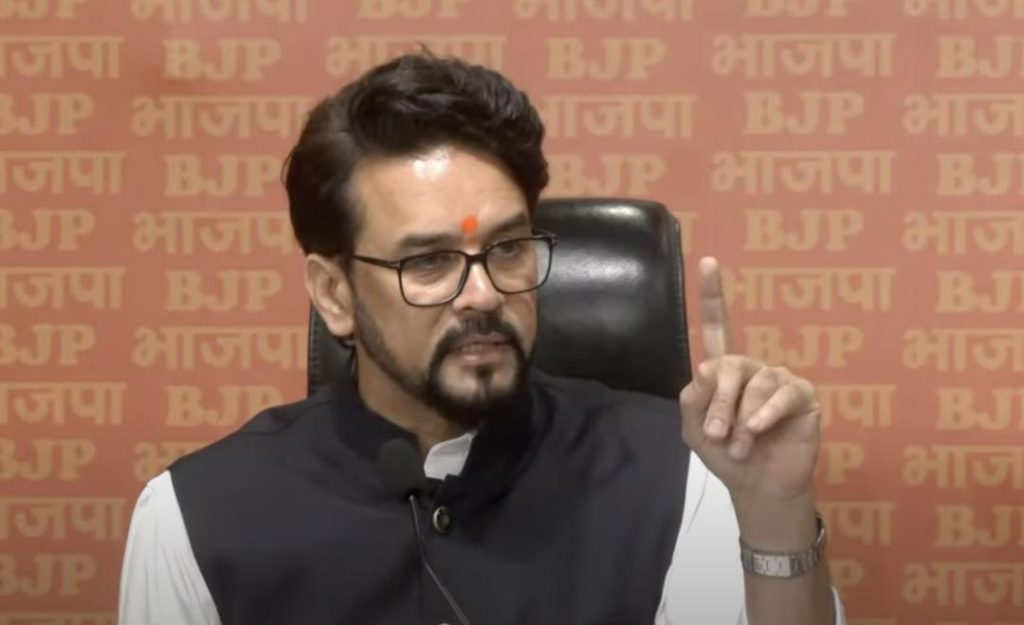
Congress & CPI made Bhimrao Ambedkar lose the poll in 1952: BJP
The Indian democracy has come a long way since its inception in 1952. With each passing election, the political landscape has undergone significant changes. However, the roots of electoral corruption in the country can be traced back to the very first election held in 1952. BJP MP Anurag Thakur made this revelation recently, sparking a lively debate on the political arena.
According to Thakur, the Congress party, along with its communist allies, played a significant role in defeating Dr. Bhimrao Ambedkar, the architect of the Indian Constitution and a revered Dalit leader, in the 1952 election. The BJP MP made these remarks while addressing a gathering in Himachal Pradesh, where he accused the Congress of laying the foundation of electoral corruption in the country.
In his scathing attack, Thakur stated that 74,333 votes were rejected in the election, a staggering number that highlights the level of manipulation and corruption that took place. He further alleged that the Congress party deliberately ensured that Ambedkar, a constitution maker and a saint-like leader, was eliminated from the political scene in the very first election.
Ambedkar, a towering figure in Indian politics, was a key player in the country’s transition to independence. He was the Chairman of the Constitution Drafting Committee and played a crucial role in framing the Indian Constitution. Despite his immense contributions to the country, Ambedkar’s political career was marked by controversy and power struggles.
Thakur’s remarks have sparked a heated debate in the political circle, with many calling for a re-examination of the 1952 election. The BJP MP’s comments have also raised questions about the role of the Congress party in the country’s political history.
The Congress party, however, has refuted Thakur’s claims, calling them baseless and malicious. Party spokespersons have argued that the allegations are an attempt to tarnish the Congress party’s image and distract from the party’s achievements.
Despite the controversy, Thakur’s remarks have brought to the forefront the need for transparency and accountability in the country’s electoral process. The high number of rejected votes in the 1952 election is a stark reminder of the flaws in the electoral system and the need for reforms.
The 1952 election was a significant milestone in Indian politics, marking the country’s transition from a British colonial rule to an independent democracy. The election saw a high turnout, with millions of Indians casting their votes to choose their representatives.
However, the election was marred by controversy and allegations of rigging and voter suppression. The Congress party, which was in power at the time, was accused of manipulating the electoral process to ensure its own victory.
The allegations of electoral fraud were not limited to the Congress party alone. The Communist Party of India (CPI), which was a major force in Indian politics at the time, was also accused of using underhanded tactics to influence the election outcome.
In the aftermath of the election, the Indian government set up a commission to investigate allegations of electoral fraud. The commission found evidence of widespread irregularities, including allegations of vote rigging, intimidation, and corruption.
The findings of the commission led to significant changes in the country’s electoral laws and procedures. The election commission was given more powers to conduct free and fair elections, and measures were introduced to prevent electoral fraud.
Despite these changes, the 1952 election remains a significant milestone in Indian politics, highlighting the need for transparency and accountability in the country’s electoral process. Thakur’s remarks have brought to the forefront the need for a re-examination of the country’s political history, and the role of the Congress party in it.
In conclusion, the remarks made by BJP MP Anurag Thakur have sparked a lively debate on the political arena, highlighting the need for transparency and accountability in the country’s electoral process. The controversy surrounding the 1952 election has brought to the forefront the need for a re-examination of the country’s political history, and the role of the Congress party in it.
News Source:
https://youtu.be/0kLyW5rSJSg






